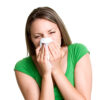
Sharp Increase in Flu Hospitalizations, Deaths in Eastern Washington, Northern Idaho
For more information, contact Kim Papich, SRHD Public Information Officer (509) 324-1539 or kpapich@srhd.org
SPOKANE, Wash. – Officials from Spokane Regional Health District (SRHD) and Panhandle Health District (PHD) are seeing marked increases in flu hospitalizations and deaths, prompting a reminder to residents in both areas to get vaccinated and, if a person does become ill, to consult with a healthcare provider about diagnosis and possible treatment with antiviral drugs.
This season, 179 individuals have been hospitalized in Spokane County with laboratory-confirmed flu, compared to 57 admissions during the same period last year; seven deaths are now attributed to flu in the county, compared to one death at this time last year. Twenty-one influenza deaths have been reported in Washington state for this season.
Idaho has had 13 deaths so far this season, making it the deadliest for this time of year since 2010. Eight of those deaths have been within Idaho’s five most northern counties, the region for Panhandle Health District.
It is recommended that all people 6 months of age and older get immunized against flu. The vaccine promotes antibody protection within two weeks.
“We are seeing flu cases throughout northern Idaho,” said Jeff Lee, PHD epidemiologist. “Typically, the peak of the flu season is January through March, so it’s not too late to get a flu shot.”
According to Centers for Disease Control and Prevention (CDC), while vaccine effectiveness can vary, recent studies show that flu vaccination reduces the risk of flu illness by between 40% and 60% during seasons when most circulating flu viruses are well-matched to the flu vaccine. Flu vaccination may also reduce flu illness severity; so, while someone who is vaccinated may still get infected, their illness may be milder.
The flu vaccine works best among healthy adults and older children. Some older people and people with certain chronic illnesses might develop less immunity than healthy children and adults after vaccination. However, even for these people, the flu vaccine still may provide some protection.
“Most people who get the flu will have mild illness and recover quickly, but certain groups are at high risk for developing flu complications that can sometimes result in hospitalization and occasionally death,” said Mark Springer, SRHD epidemiologist. “Your best chance at protecting your loved ones, and yourself, from flu is to get a flu shot.”
People who have the flu often feel some or all of these symptoms:
- Fever or chills
- Cough
- Sore throat
- Runny or stuffy nose
- Muscle or body aches
- Headaches
- Extreme fatigue (very tired)
When it comes to flu and seeking care from a healthcare provider, those people at higher risk of complications should call and consult with their provider when ill. Additionally, while most people who do become ill with flu can be safely cared for at home, there are some symptoms, like trouble breathing, that should trigger immediate emergency care.
Sick individuals should also talk to their providers about antiviral drugs, an important second line of defense that can be used to treat flu illness. Health officials recommend the use of antiviral drugs as early as possible to treat flu illness in people who are very sick with flu and those at high risk of serious flu complications.
Flu viruses spread when people with flu expel droplets from their mouths or noses while coughing, sneezing or talking. These droplets can land in the mouths or noses of people who are nearby. People can also get flu by touching a surface or object that has flu virus on it and then touching their own mouth, eyes or nose. In addition to flu vaccination, both health districts also recommend frequent hand washing with warm water and soap, covering coughs and sneezes and staying home if sick.
For more information about influenza and influenza vaccine visit cdc.gov/flu, srhd.org or panhandlehealthdistrict.org. Spokane Regional Health District’s website also offers comprehensive, updated information about Spokane Regional Health District and its triumphs in making Spokane a safer and healthier community. Become a fan of SRHD on Facebook to receive local safety and wellness tips. People can also follow the health district on Twitter @spokanehealth.


